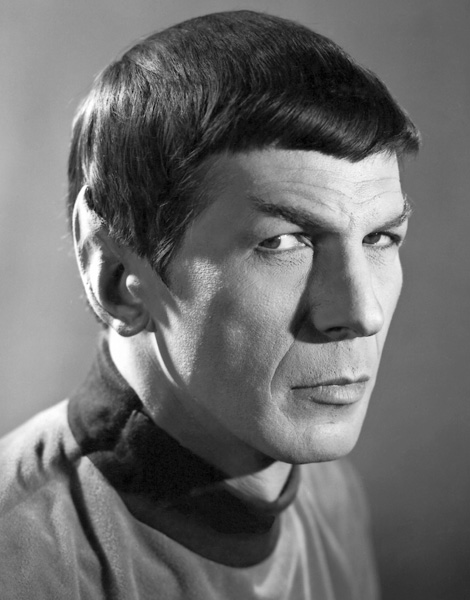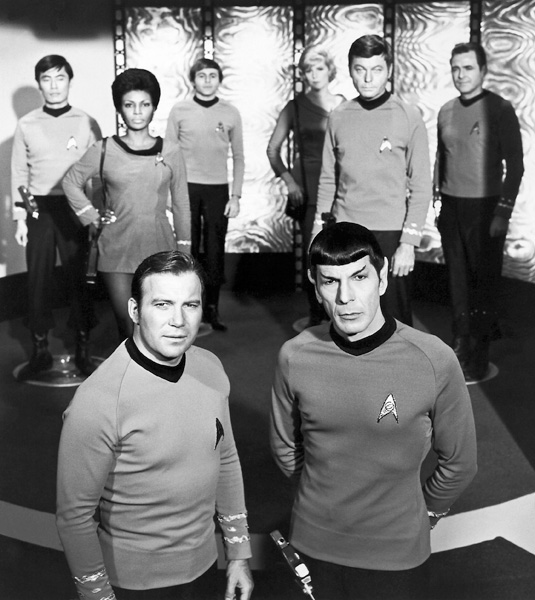45
Awards Won (and Lost), 1966–75
Palm Leaf of Axanar Peace Mission, Grankite Order of Tactics, Prentares Ribbon of Commendation (Classes First and Second), Award for Valor, Medal of Honor, Silver Palm with Cluster, Starfleet Citation for Conspicuous Gallantry, Karagite Order of Heroism …
That’s the list of Captain Kirk’s medals and commendations, as rattled off by the Starfleet Computer in the episode “Court Martial” before attorney Cogley (Elisha Cook Jr.) decides the court has heard enough and halts the recitation. Star Trek wasn’t quite as decorated as the captain of the Enterprise. Here’s a complete rundown of honors bestowed on Star Trek and its animated successor.
Emmy Awards
The Emmy Awards, bestowed annually since 1949 by the Academy of Television Arts & Sciences, remain the industry’s most prestigious honor. During its three-year run, Star Trek earned a total of thirteen nominations but failed to bring home a trophy. Later Star Trek series earned more nominations (142 in all) and sometimes won Emmys (thirty-three altogether) but rarely received recognition in the major categories. The original Trek was nominated as Outstanding Dramatic Series following each of its first two seasons. The only other Trek series to be so honored was The Next Generation, which earned a similar nomination in its final season. Leonard Nimoy, nominated as Outstanding Supporting Actor, remains the only cast member to earn an Emmy nomination for his work on a Star Trek program.
In 1967, following its first season, Star Trek was nominated for five Emmy Awards but lost in every category. The nominations:
• Outstanding Dramatic Series, which Star Trek lost to Mission: Impossible.
• Outstanding Performance by an Actor in a Supporting Role in a Drama (Leonard Nimoy). Eli Wallach won for his work in the TV movie The Poppy Is Also a Flower. (At the time, supporting performers in TV movies and series competed in the same category.)
• Individual Achievements in Art Direction and Allied Crafts (to Jim Rugg for mechanical special effects). The Emmy went to the CBS special Mark Twain Tonight.
• Individual Achievements in Cinematography (to Darrell Anderson, Linwood Dunn, and Joseph Westheimer for special visual effects). The stodgy Western Bonanza took home the award in this category. This was arguably Star Trek’s most galling defeat.
• Individual Achievements in Film and Sound Editing (to Douglas Grindstaff, sound editor). Star Trek lost to Irwin Allen’s Voyage to the Bottom of the Sea. (But at least it wasn’t Lost in Space!)
A year later, Star Trek was nominated in four categories:
• Outstanding Dramatic Series, which it again lost to Mission: Impossible.
• Outstanding Performance by an Actor in a Supporting Role in a Drama (Leonard Nimoy), who this time lost to Milburn Stone—“Doc” from Gunsmoke.
• Outstanding Achievement in Film Editing (Donald R. Rode, editor). This Emmy went to NBC’s Bell Telephone Hour.
• Special Classification of Individual Achievements (the Westheimer Company, for Special Photographic Effects). This was a strange, catch-all category for outstanding work that didn’t fit conveniently under any other category. Multiple nominees were named from various disciplines. In 1968, there were seven nominees and two Emmys awarded, both to actors: Art Carney of The Jackie Gleason Show and Pat Paulsen of The Smothers Brothers Comedy Hour.
In 1969, following its final campaign, the show earned four more nominations:
• Outstanding Continued Performance by an Actor in a Series (Leonard Nimoy). This category was for lead actors, not supporting ones—which is where Nimoy should have been nominated in the first place. Nevertheless, he lost again, this time to Don Adams of Get Smart.
• Outstanding Achievement in Art Direction and Scenic Design (John Dyer, set decorator, and Walter M. Jefferies). Matt Jefferies finally received an overdue nomination but lost to Mission: Impossible.
• Outstanding Achievement in Film Editing (Donald R. Rode, editor). The award went to Judd for the Defense, one of the few shows Star Trek outperformed in the Nielsen ratings.
• Special Classification Achievements (Howard A. Anderson Company, The Westheimer Company, Van der Veer Photo Effects, and Cinema Research for special photographic effects). Almost inconceivably, the show’s visual effects never won an Emmy. This year there were nine nominees for Special Classification Achievements and four Emmys issued. They went to actors Harvey Korman for The Carol Burnett Show and Arte Johnson for Rowan & Martin’s Laugh-In, and producers Don Meier for Mutual of Omaha’s Wild Kingdom and Warren Steibel for Firing Line with William F. Buckley.

Leonard Nimoy earned three consecutive Emmy nominations but lost three years in a row.
Star Trek finally won an Emmy in 1975 when the animated series was named Outstanding Entertainment Children’s Series at the Second Annual Daytime Emmy Awards. The award went to Filmation founder/president Lou Scheimer. The previous year, the series had earned a nomination in the same category but lost to the PBS show Zoom.
Hugo Awards
The Hugo Awards, handed out annually at the World Science Fiction Convention and based on attendee’s votes, were initiated in 1953 and remain one of the genre’s most distinguished honors. The award is named for legendary Amazing Stories publisher Hugo Gernsback, who coined the term “science fiction.” Although the Hugos were created to honor literary sci-fi, in 1960, a category was added for Best Dramatic Presentation. Over the years, nominees in this category have included movies, TV shows, record albums, and other disciplines. However, television programs have rarely won Hugo Awards. There are just two exceptions: Rod Serling’s The Twilight Zone, which claimed the first three Hugos awarded in the category, and Star Trek.
In 1967, “The Menagerie, Parts I and II” won the Hugo for Best Dramatic Presentation. That year, two other Trek episodes were nominated in the same category (“The Naked Time” and “The Corbomite Maneuver”). In 1968, all five Hugo nominees in the category were Star Trek episodes—“The Trouble with Tribbles,” “Mirror, Mirror,” “The Doomsday Machine,” “Amok Time,” and the award-winning “City on the Edge of Forever”—a singular achievement on par with the Beatles holding all five spots on the Billboard pop chart simultaneously. It is unlikely ever to be equaled. In 1969, following its beleaguered third season, Star Trek failed to earn a single Hugo nomination.
Following Star Trek’s dominance in 1968, no TV show won a Hugo for the next twenty-five years, when The Next Generation won a Hugo for the episode “The Inner Light.” In all, Next Gen earned three Hugo nominations and won twice. Deep Space Nine and Star Trek: Enterprise earned two Hugo nominations apiece but never won. All the Star Trek feature films except The Final Frontier and Nemesis were Hugo-nominated, but no Trek movie has ever won the award.

The entire cast assembled on the transporter pads for this publicity still. (If they all beam out, who’s going to run the ship?)
Writers Guild of America Awards
The Writers Guild of America Awards, voted on by members of the professional organization for screenwriters, has held two ceremonies per year since 1933, one for East Coast Guild members and one for West Coast Guild members. In 1968, two Star Trek teleplays earned Writers Guild nominations—John T. Dugan’s “Return to Tomorrow” and Harlan Ellison’s “The City on the Edge of Forever.” Ellison’s screenplay won, which created a minor controversy because the writer submitted his original, first draft of the screenplay rather than the heavily rewritten version that was actually produced. Gene Roddenberry submitted the broadcast version of “City on the Edge” for Hugo consideration, where it also won. Ironically, both awards went to Ellison.
NAACP Image Awards
Star Trek also received one of the first Image Awards from the NAACP in 1967. That year, the NAACP launched its annual awards ceremony to honor achievement by people of color in film, television, music, and literature. Nichelle Nichols, for her inspiring portrayal of Lieutenant Uhura, was the first television performer to win the award.
Contemporary Honors and Awards
Over the years, countless polls—taken by magazines and cable TV channels or over the Internet—have asked fans and/or critics to name the best science fiction TV series of all time. Star Trek regularly finishes at or near the top of these lists, especially when voting is left up to fans. Trek’s stiffest competition usually comes from classic programs like The Outer Limits and The Twilight Zone, newer shows such as The X-Files, Babylon 5, the new Battlestar Galactica, and its own progeny, especially The Next Generation.
In recent years, Star Trek also has been honored through television specials and magazine articles, achievements that compensate in part for the glaring disconnect between the show’s enduring cultural impact and its many Emmy defeats.
TV Guide —When this venerable weekly named its 50 Greatest TV Shows of All Time in 2002, the original Star Trek series failed to make the cut, even though The Next Generation finished No. 46. However, when TV Guide published its survey of the Top Cult Shows Ever in 2004, the classic Star Trek finished No. 1—and was the only Trek series to make the twenty-five-show list.
TV Land Awards—The TV Land cable network honored Star Trek with its Pop Culture Award during the initial broadcast of its annual TV Land Awards in 2003.